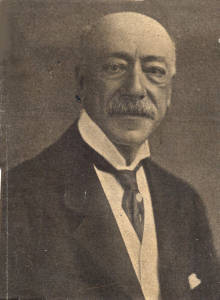Lodge “Ernesto Nathan”, recently established by Brethren previously members of Lodge “Giordano Bruno – Vittorio Spada” no. 22 of Rome, is a new member Lodge of the Grand Liberal Lodge of Italy
With the “Ernesto Nathan” Lodge, which was registered at no. 30 of the list of the member Lodges of the G.L.L.I. , the activity of the Grand Liberal Lodge has resumed in the city of Potenza.
Ernesto Nathan (1848-1921) was an Italian Jewish politician, mayor of Rome, known for his political and social activism in the Belle Époque period. Nathan was born in Venice into a Jewish family. He then moved to Turin, where he studied law and began his political career. In 1876 he was elected to the Italian parliament, where he distinguished himself as a strong supporter of secularism and the separation of Church and State.
Nathan was initiated into Freemasonry in 1887; in 1893 he was raised Master Freemason in Lodge “Propaganda Massonica” in Rome and, in 1896 he was elected Grand Master of the Grand Orient of Italy, succeeding Adriano Lemmi, and remaining in office until 1904, and then again from 1917 to 1919. Awarded with the 33rd and Last Degree of the Ancient and Accepted Scottish Rite, he was a member of the Supreme Council of Italy.
In 1889 he was among the founders of the Dante Alighieri Society.
In 1907 Nathan was elected mayor of Rome, a position he held for nine years. During his tenure, Nathan was committed to improving the lives of Roman citizens, especially the lower classes. He promoted important social reforms, including the construction of new schools, hospitals and public housing. Nathan, faithful to Masonic principles throughout his life, was also a civil rights activist, especially for the rights of Jews in Italy. His election as mayor of Rome was a historic event, as Nathan was the first mayor of a major European city to publicly profess his Jewish faith. His membership in Freemasonry was criticized by the Catholic Church, but this did not affect his political activity.
Nathan is considered one of the most prominent lay leaders of modern Italy and his figure is still highly respected today. His political and social legacy has been a strong inspiration for many later Italian activists and politicians.

 IT
IT


